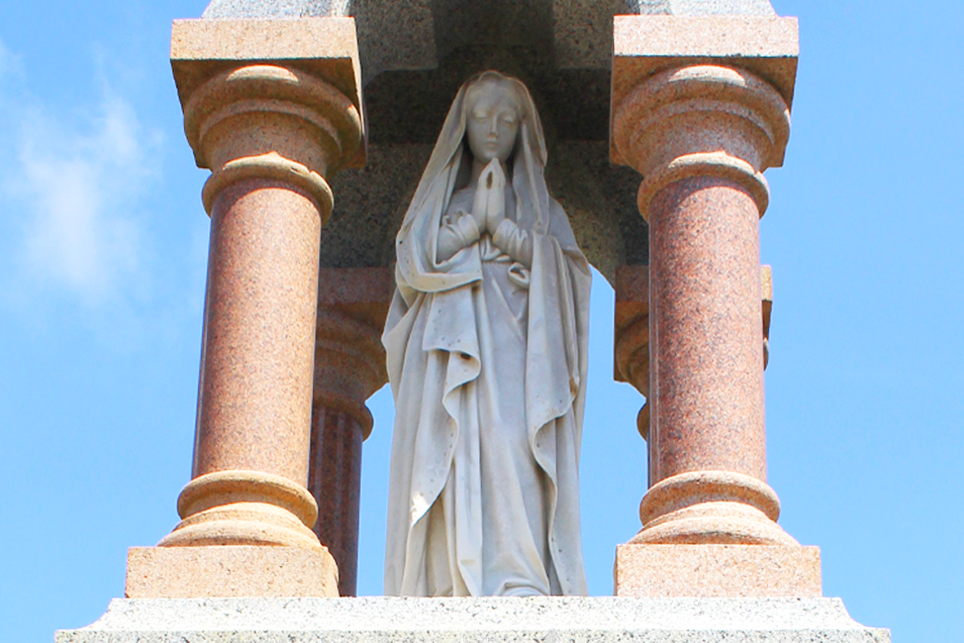
Father Julian Tenison Woods’ deep spiritual devotion to Mary and his profound connection to God through the natural world, were not mere facets of his life; they were sources of his vitality and inspiration.
Nature (or ‘Mother Nature’), like Mary the Mother of God, is a (‘sacramental’) sign of God’s grace which allows God’s presence to flow into us. Fr Julian found solace and revelation in both Mary’s maternal embrace and the nurturing beauty of nature. His life’s work in the natural sciences was more than an academic pursuit; it was a testament to the belief that all of creation offers glimpses of the infinite beauty of its Creator. Fr Julian’s reverence for Mary and for nature’s Creator breathed life into his very being, his ‘soul’, allowing him to provide his spiritual children insight into the interconnectedness of faith, science, and the world around us.
Mother Mary is like Mother Nature in another way, too. Charles Darwin’s theory of evolution explains how life develops through the process of natural selection. Nature selects what is fit to survive. Mary is like Mother Nature in that she, too, ‘selects’. But in an altogether greater way, because Mary selects what is infinitely beyond any natural form of life – the Holy, or ‘supernatural, Spirit of God. She is the model par excellence of the ‘feminine genius’: open, contemplative, yet highly selective, and of extraordinary judgment. She magnified and nurtured the fruit of this selection, her son, as Mother Nature nurtures her living constituents.
As she did so, Mary continually contemplated her son as the revelation of her Creator and the God of her ancestors. When her son came of age, she did not coddle and overprotect him, but made the supreme sacrifice every good mother must: she let him go and allowed him to grow up: she encouraged him to be who he was meant to be, even when it meant hardship, suffering, and death.
And yet, in all those situations, Mary also remained present to her son, even as he hung crucified. Indeed, as she stood by him at the foot of his cross, he gave her to be the mother of all, the mother who opens the way, points to, and contemplates God breaking into our world, including the natural world. It is this gift that allowed Fr Julian to write:
With Mothers smile to cheer,
In Mother’s love confiding,
What danger can I fear?
With Mother’s arms about me
How can I be afraid,
Mother how can I doubt Thee,
Or feel the least dismayed?
Through Mary, Christ comes into and re-creates the world through her as the divinised embodiment of the natural world. It is no wonder Fr Julian devoted so much of his life to the natural sciences. It was through the natural world that he received the gifts of God.
Fr Julian said: “All created things give us ideas and glimpses of the beauty of the infinitely beautiful creator”. This also helps us understand why he and many of us are so very much at home in nature. Nature’s beauty attracts us, it draws us out of our own heads, our fantasies, plans, worries, and anxieties. Beauty humbles us as it draws us to something greater, something beyond what we currently understand. It draws us into God’s life.
We are able to see ourselves as the contemplative surfer does: she does not make the wave come, she sits, contemplating the movements and immensity of the ocean, and when the time is right, she exerts every effort to catch and ride the wave. This fills her with life. This is a taste of what God desires for each of us; to be attentive to His Spirit and to act when it calls upon us.
And so, it was with Fr Julian. He spent time in nature, studied it, pondered it, and when those moments of transcendent insight (revelation) came, he savoured them, contemplatively treasuring, and pondering them in his heart. In this way, the Holy Spirit animated and enlivened his missions, writing and preaching. His inspiration gives us a sense of the beauty, goodness, and truth that reflect God himself.
If we are serious about loving and preserving the natural world, and the divine femininity embodied by Mary, we would do well to be instructed by Fr Julian and return often to Mary the Mother of God. Presence begets love, and what we love we preserve. She is what the church is meant to be – open, contemplative and ‘selective’ of the Spirit of God. She is of Earth, natural, reminding us that, more often than not, it is through the natural and the immanent that God reveals the supernatural and the transcendent.
As we return with Fr Julain to Mary we should also return with him to nature: to being open, contemplative, and ‘selective’. This is not news to the traditional people of this land. When we allow ourselves to be filled with grace, the grace of awe and gratitude to the Creator, the Lord will indeed be with us. He combines and balances the masculine or feminine in such a way as to overcome any exaggeration of those elements that can unbalance our culture, including that of our church.
So let us join Father Julian in asking Mary to be with us sinners, now and at the hour of our death.
St Joseph,
St Mary MacKillop
Pray for us.
Daniel de la Motte
Josephite Mission and History Centre, Tasmania
